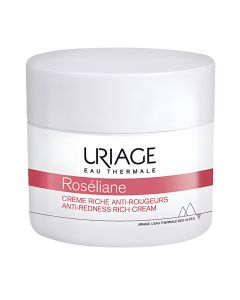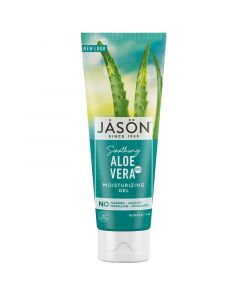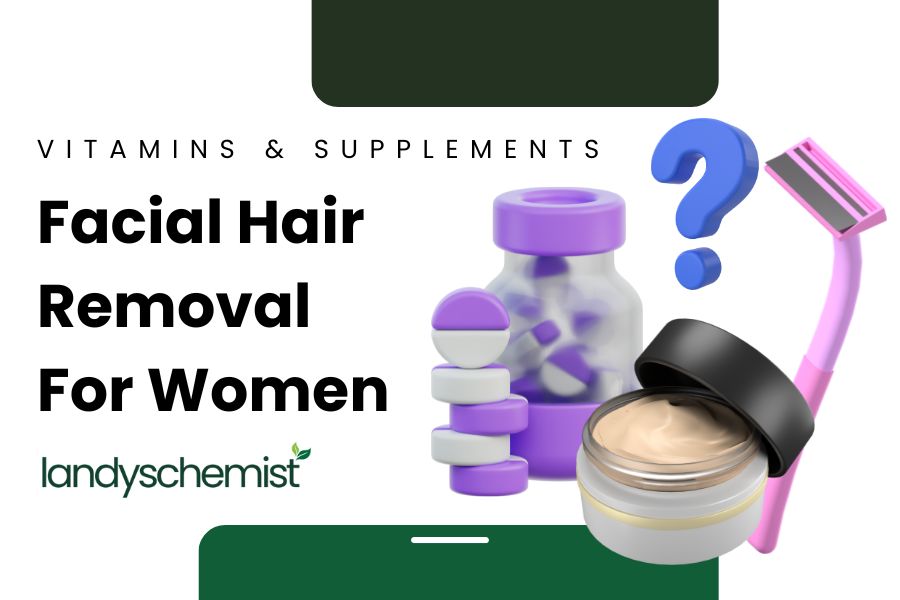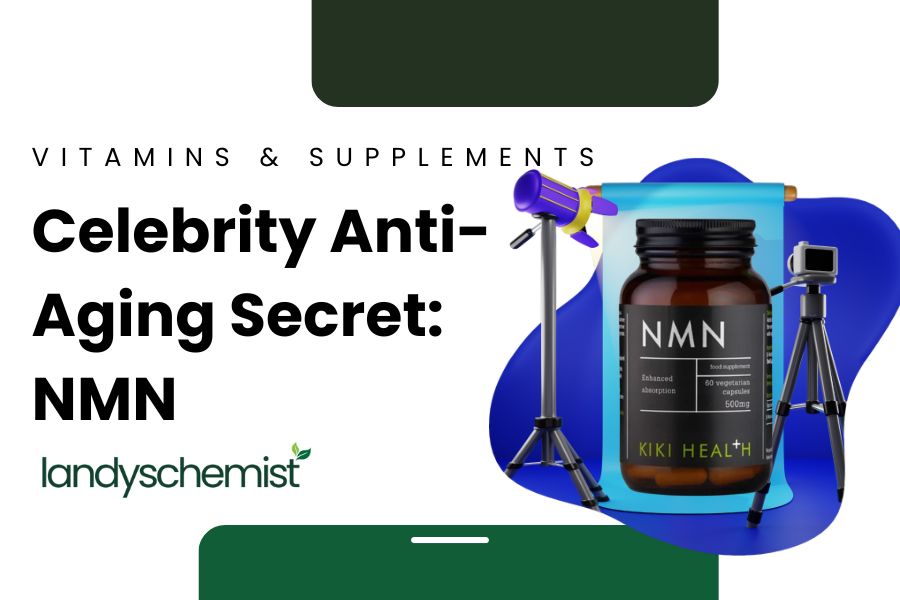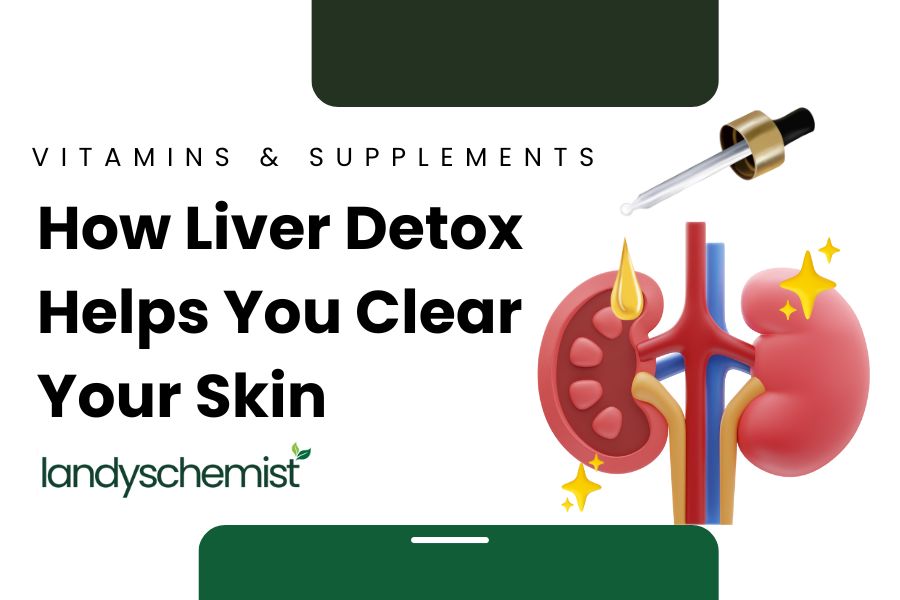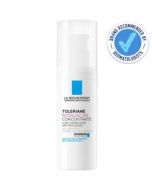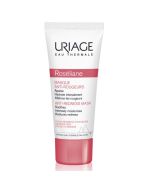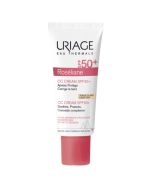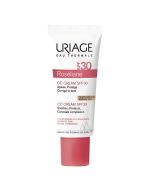
Best Creams for Rosacea
What is Rosacea?
Affecting about 1 in 20 people in the UK[1], rosacea is one of the most common inflammatory skin conditions. Its main characteristics include facial redness along with small bumps. This inflammatory skin condition is often mistaken for acne, but a key distinguishing factor would be the enlarged blood vessel that is an early indicator of rosacea.
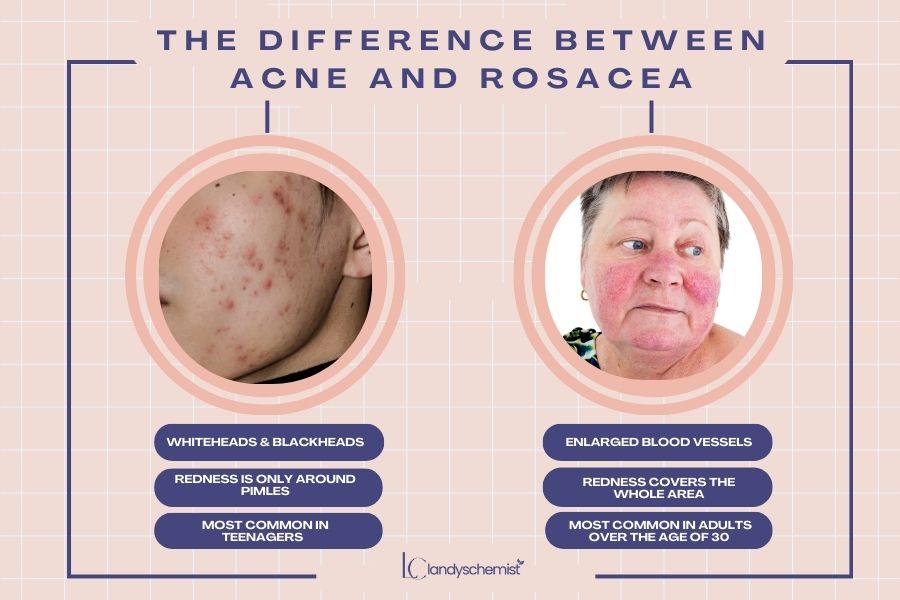
This blog will explore the potential causes of rosacea and highlight the essential ingredients to look for when choosing a moisturiser or cream to help manage the condition.
Causes of Rosacea
Even though there isn’t a definitive cause for rosacea, there are quite a few contributing factors that have been identified. A common misconception is that rosacea can only be an effect of genetic predisposition, although studies have shown that environmental and lifestyle factors can also trigger the condition, and lead to flare-ups for individuals already struggling with rosacea[2]. So, what could these main causes be?
1. Genetics and Hormones
There is evidence to suggest that rosacea runs in families, indicating a genetic component[3]. There is also an evident relationship between rosacea and menopause (this might not come as a surprise, knowing that rosacea usually appears after the age of 30), as hot flashes associated with climacteric can lead to rosacea outbreaks[4].
2. Environmental and Lifestyle Factors
Too much time spent outside, especially during summer can worsen already existing rosacea. Sunlight contains ultraviolet (UV) rays that can penetrate the skin, causing blood vessels to expand and become more noticeable[5]. This leads to the distinctive redness associated with the skin condition. Spicy foods and alcohol are known to trigger flare-ups, while intense exercise can also exacerbate symptoms.
3. Skincare and Cosmetic products
Even though they might not be a cause for the condition itself, certain ingredients in skincare and cosmetic products can irritate the skin and significantly worsen rosacea. That is why we aimed to recommend products that are gentle, soothing and specifically formulated for sensitive, rosacea-prone skin.
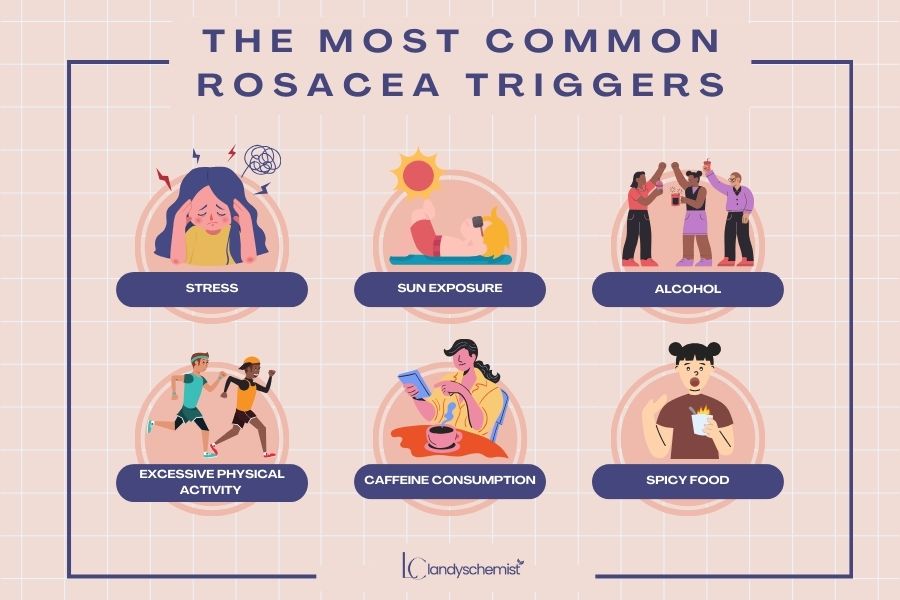
Best Skincare ingredients for Rosacea
Now, knowing the possible symptoms and causes, we have listed some of the most efficient ingredients to heal rosacea below.
- Aloe Vera: This popular ingredient is beneficial for rosacea due to its soothing properties, which help reduce redness and irritation. It provides deep hydration, essential for managing dry, sensitive skin. Furthermore, its anti-inflammatory compounds help decrease swelling and support the skin’s healing process.
- Niacinamide: Staying on the mission of redness reduction, niacinamide is also a key ingredient to look for, due to its proven sensitivity lowering effects. Niacinamide can help with rosacea by strengthening the skin's barrier function, which reduces moisture loss and protects against environmental irritants that can trigger flare-ups. It also has anti-inflammatory properties that help to reduce the appearance of dilated blood vessels often associated with rosacea.
- Ceramides: Ceramides are lipids, which are essential fats that are naturally present in skin cells, making up 30% to 40% of the outer skin layer[6]. Ceramides can help to reinforce the skin’s natural barrier, especially after a rosacea flare-up.
- Azelaic Acid: This well-known skincare ingredient is a highly effective choice due to its anti-inflammatory properties, which help reduce redness and swelling. Its antimicrobial action helps to control bacterial growth, further alleviating rosacea symptoms.
Best Creams for Rosacea
In the next section, we have curated a selection of three creams that, thanks to their ingredients, are excellent choices for managing rosacea symptoms and soothing sensitive skin.
Uriage Roséliane Anti-Redness Rich Cream
Uriage’s nourishing everyday cream provides a hydrating formula is designed to calm redness and strengthen the skin’s barrier, making it ideal for sensitive, reactive skin.
Key benefits aiding rosacea:
- Visibly diminishes redness and soothes skin irritation
- The deep hydration formula helps to restore and maintain the skin’s natural barrier, which is crucial for managing rosacea symptoms
- Enhances skin comfort by relieving tightness and dryness often associated with rosacea
JASON Aloe Vera 84% Crème
This natural Aloe Vera cream is uniquely enriched with Almond Oil and Vitamin E, providing extra care and soothing for the skin. Usage is very simple; apply daily to the face and body, massaging thoroughly into areas where needed.
Key benefits aiding rosacea:
- Provides long-lasting hydration
- Helps restore the skin’s natural moisture barrier
- Almond oil helps tighten lose and “worn-in” skin
Avene is a household brand trusted by both healthcare professionals and its loyal users. This day cream provides anti-inflammatory properties, as well as sun protection, making it a great choice for people looking to protect their skin from the implications of rosacea throughout the whole day.
Key benefits aiding rosacea:
- Sun protection prevents UV exposure, which – as mentioned before – causes rosacea flare-ups
- Contains shea butter, an agent for intense nourishment
- Helps reduce visible redness and puffiness
FAQ
How can I get rid of rosacea completely? Can it be cured?
Unfortunately, as of now, there is no permanent cure for rosacea, however symptoms can be controlled through lifestyle and environmental adjustments, as well as following a skincare routine which aims to reduce the condition.
Can diet affect rosacea?
As mentioned before, even though diet is nowhere near the cause of rosacea, it plays a vital role in managing its symptoms and mitigating its effects. Avoiding too hot, overly salty and spicy food, and focusing more on a nutrition-dense diet will show a significant improvement in the rejuvenation of rosacea-damaged skin.
Who is most affected by rosacea?
Rosace is most common for women between the ages of 30 and 60 (this is why some of its symptoms are associated with menopause-related problems). Although it is more prevalent in women (especially individuals with lighter skin), symptoms appearing in men can often be more severe[7].
Are there any lifestyle changes that can help manage rosacea?
By following a recommended diet and establishing a low-stress environments for both work and everyday life, as well as staying physically active through light exercises, you can significantly manage rosacea symptoms and improve overall skin health. It is very important to discuss the details of your healing journey with a dermatologist in order to get the most personalised options possible.
References
[1] https://patient.info/skin-conditions/skin-rashes/rosacea
[2] https://www.niams.nih.gov/health-topics/rosacea
[3] https://www.ncbi.nlm.nih.gov/pmc/articles/PMC8884184/
[4] https://www.dermatologytimes.com/view/rosacea-and-menopause
[5] https://www.sciencedirect.com/science/article/pii/S0022202X19333007
[6] https://www.webmd.com/beauty/what-to-know-about-ceramides-for-skin

